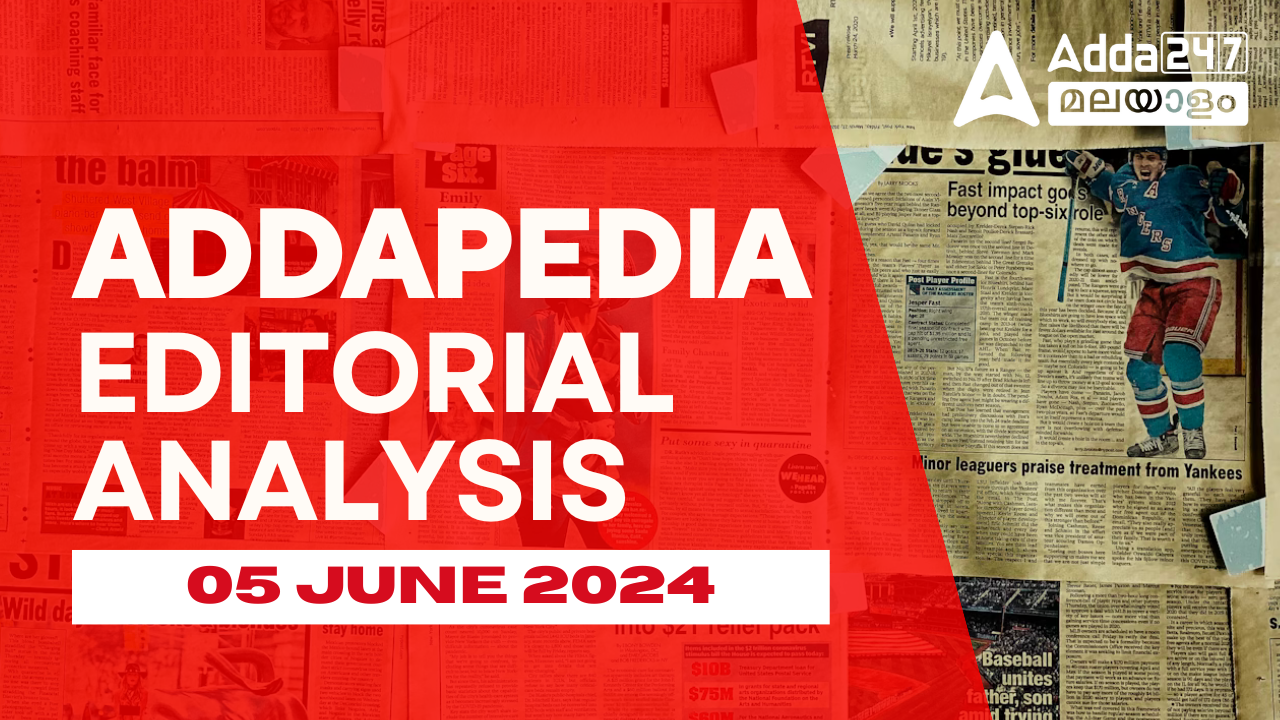Table of Contents
Addapedia Editorial: Daily News Editorial PDF, 05 June 2024
Addapedia Daily News Editorial PDF, 05 June 2024: In this Addapedia Editorial Analysis, We cover Important News Editorials from Newspapers and provide you with detailed analysis. This ADDAPEDIA Editorial Analysis will help you in understanding the National and International events Current affairs and the background of a particular topic. This comprehensive News analysis will help you in Clearing CA and Interview for many exams
Editorials usually cover a particular topic that might be National, State or any International event which is most important to acquire brief knowledge about the event. Editorials are written by Famous news analysts, Politicians, Business analysts, Civil Servants or a person who has immense knowledge in that particular field. Knowing Editorials will not only understand the geo-political relations but also how to write and describe any particular issue which helps especially in PSC, SSC and Banks Exams.
SEBI Forms Panel for restructuring Clearing Corporations
The SEBI has set up a committee to review the ownership and economic structure of clearing corporations and suggest measures to ensure that clearing corporations function as resilient, independent, and neutral risk managers.
What is Securities and Exchange Board of India (SEBI)?
- The SEBI is a statutory regulatory body established by the Government of India through the SEBI Act, 1992.
- Objective: To regulate the securities market in India and protect the interests of investors in securities.
What are the powers of SEBI?
- Quasi-judicial powers: In case of frauds and unethical practices pertaining to the securities market, SEBI has the power to pass judgments.
- Quasi-executive powers: SEBI has the power to examine the Book of Accounts and other vital documents to identify or gather evidence against violations. If it finds one violating the regulations, the regulatory body has the power to impose rules, pass judgements and take legal actions against violators.
- Quasi-legislative powers: To protect the interest of investors, the authoritative body has been entrusted with the power to formulate suitable rules and regulations. Such rules tend to encompass the listing obligations, insider trading regulations and essential disclosure requirements.
What is a Clearing Corporation?
- A Clearing Corporation is a financial institution that acts as an intermediary between buyers and sellers in financial markets to ensure the smooth and efficient settlement of transactions.
- Here are its main functions and features:
- Intermediary Role: It stands between the two parties in a transaction, becoming the buyer to every seller and the seller to every buyer.
- Guaranteeing Settlement: By guaranteeing the completion of transactions, it reduces the risk of counterparty default. If one party fails to fulfil their part of the deal, the Clearing Corporation steps in to ensure the transaction is completed.
- Clearing and Settlement: It facilitates the process of clearing (matching and confirming trade details) and settlement (transferring funds and securities between parties).
- Transparency and Efficiency: It enhances market transparency and efficiency by standardizing procedures, improving liquidity, and ensuring that all trades are settled in a timely manner.
- Regulatory Oversight: Clearing Corporations are regulated by SEBI to ensure they operate in a sound and stable manner, safeguarding the interests of all market participants.
- Example: Clearing Corporation of India Limited (CCIL)
What was Usha Thorat committee to review the ownership and economic structure of clearing corporations?
- The SEBI has set up an ad-hoc committee chaired by Usha Thorat, former Deputy Governor of the Reserve Bank of India (RBI).
- Objectives of the Committee:
- To review the ownership and economic structure of clearing corporations and
- Suggest measures to ensure that clearing corporations function as resilient, independent, and neutral risk managers.
- With regards to ownership structure, the committee will examine the feasibility, and broadening the list of eligible investors, who are allowed to take shareholding in a clearing corporation.
- The committee will then suggest categories of investors who can acquire stakes in such corporations.
- The committee has been formed due to the substantial growth of Indian securities markets in recent years and the importance of clearing corporations as central risk management institutions.
Coalition government and economic reforms in India
The NDA has won a historic third term at the Centre, but the BJP fell short of the 272-seat majority, necessitating a coalition government.
Why is there an argument that Coalition govt cannot undertake strong economic reforms?
Coalition govts in India have historically faced challenges in implementing strong economic reforms due to differing priorities among coalition partners.
- Diverse Interests: Coalition partners often have varied political and economic agendas, leading to compromises and diluted reforms. This can slow down or alter the trajectory of economic reforms.
- Consensus Building : While coalition governments can foster broader consensus, the need to appease various factions might lead to weaker reform measures. Achieving a unified stance on complex economic issues becomes difficult.
- Policy Stability: Frequent changes in coalition partners or internal disagreements can lead to policy instability, affecting investor confidence and long-term economic planning.
What is the other perspective on coalition govt and economic reforms in context of India?
It is often said that coalition government derail India’s economic reforms trajectory. But, this is not true in Indian context as many notable reforms were brought by the previous coalition governments. For Example:
- P V Narasimha Rao Government: Economic Liberalization
- Economic Reforms: The minority government led by P V Narasimha Rao initiated major economic reforms, discarding centralized planning, and opening the Indian economy to global competition by removing the license-permit raj.
- Global Integration: India became a member of the World Trade Organisation during this period.
- Deve Gowda Government: The “Dream Budget”
- Tax Reforms: Finance Minister P Chidambaram introduced the “dream budget,” which cut tax rates for personal income tax, corporate taxes, and customs duties, fostering trust in Indian taxpayers.
- Atal Bihari Vajpayee Government: Fiscal and Infrastructure Reforms
- Fiscal Responsibility: The NDA government under Vajpayee implemented the Fiscal Responsibility & Budget Management (FRBM) law, limiting government borrowing and promoting fiscal discipline.
- Disinvestment and Infrastructure: The government advanced disinvestment of loss-making PSUs and boosted rural infrastructure with the PM Gram Sadak Yojana.
- Information Technology Act: The 2000 Act laid the foundation for India’s thriving e-commerce sector.
- Manmohan Singh Government: Rights-Based Reforms
- Education Reforms: The UPA government built on the Vajpayee-era Sarva Shiksha Abhiyan by enacting the Right to Education Act.
- Transparency and Welfare: Key reforms included the Right to Information Act, the Right to Food, and the Mahatma Gandhi National Rural Employment Guarantee Act (MG-NREGA).
- Economic and Technological Advances: Singh’s government deregulated fuel prices, initiated direct benefit transfers, and worked on Aadhaar and GST implementation.
Also, it is not guaranteed that a single party majority government can fully realize the economic reforms agenda
- The past decade under PM Narendra Modi aimed to resolve the weaknesses of coalition governments, ensuring policy stability and boosting investor confidence.
- Significant reforms such as the Goods and Services Tax (GST) and the Insolvency and Bankruptcy Code were introduced.
- However, these goals were not fully achieved.
- The government faced challenges, including failing to reform land acquisition and repealing farm reforms after widespread protests.
- The demonetisation announcement also caused significant economic uncertainty.
Hence, the statement that coalition government will necessarily derail India’s economic reforms trajectory is not true in general.
- While a coalition government can pose challenges to the economic reform trajectory, effective leadership, clear communication, and strategic compromises can mitigate these risks and maintain reform momentum.




